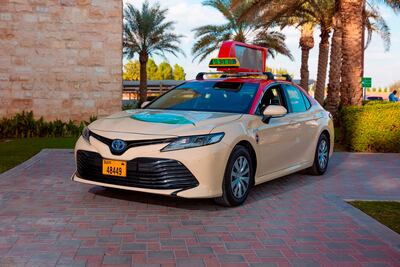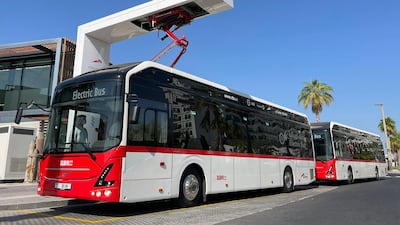Dubai Road and Transport Authority has revealed a plan to have net-zero emission public transport by 2050.
The RTA said in addition to the public transport project, it also aims to minimise its carbon footprint in its buildings and waste-management plants.
Over the coming year, the RTA plans to decarbonise all taxis, limousines and public buses, design its buildings with near-zero energy consumption, source energy from renewable sources and eliminate municipal waste.
It said the strategy would result in reducing carbon dioxide emissions by 10 million tonnes and save Dh3.3 billion.
"The new strategy outlines a comprehensive approach to sustainability within RTA," said Mattar Al Tayer, RTA director general.
"Its primary objective is to enhance sustainability and reduce carbon dioxide emissions.
"At the same time, it contributes to realising RTA’s mission of achieving global leadership in smooth and sustainable mobility through innovative roads and transport services that elevate the customer experience to world-class standards."
Under the strategy, RTA will convert 10 per cent of public buses into electric and hydrogen vehicles by 2030, expanded to 20 per cent in 2035 and increase to the entire fleet by 2050.

It also encompasses the conversion of 30 per cent of taxis and limousines in the emirate to electric and hydrogen vehicles by 2030, which will increase to 50 per cent by 2035 and 100 per cent by 2040.
The plan aims to convert 10 per cent of the emirate's school buses into electric and hydrogen buses by 2030, which will be raised to 30 per cent in 2035 to eventually reach 100 per cent by 2050.
The RTA will retrofit it buildings with solar-cell systems, with 24 structures to be installed with solar panels before 2025. The goal is to retrofit and upgrade 74 per cent of the buildings by 2030 and expanding to achieved 100 per cent by 2045. New buildings will be near zero energy starting in 2025, it said.
Waste management programmes will implemented to reuse and recycle 100 per cent of municipal waste by 2030, as well as increasing the use of recycled water in RTA’s buildings and facilities to 40 per cent by 2050.
The RTA said the new strategy is aligned with UAE's preparations for Cop28 and the UAE Net Zero by 2050 Strategic Initiative.
In February, the RTA announced plans to make its taxi fleet completely eco-friendly by 2027.
The new scheme from the emirate’s RTA will mean all taxis are hybrid, electric or hydrogen-powered by the end of the five-year plan.
Last year, the RTA announced that it was able bring down its annual costs by Dh86 million through the adoption of a number of green initiatives.
The transport authority implemented 36 “energy and green economy initiatives” in a bid to reduce its electricity, water and fuel consumption.
In 2021, the UAE unveiled its Net Zero 2050 Strategic Initiative, a Dh600 billion plan to invest in clean and renewable energy sources over the next three decades.
It was the first Gulf country to commit to net-zero emissions by 2050.
In March, the UAE government and seven emirates signed the Net Zero 2050 Charter supports the objectives of the UAE's National Net Zero by 2050 pathway that was unveiled at Cop27.
Included in the charter is a commitment from the governments of the seven emirates to enact and monitor initiatives and measures to mitigate the effects of climate change on biodiversity, the environment, biosecurity and public health.
The charter provides for the development of action plans, policies and strategies for climate action. It relies on measuring and monitoring greenhouse gas emissions in each of the seven emirates, in addition to identifying the activities and procedures that generate those emissions.

